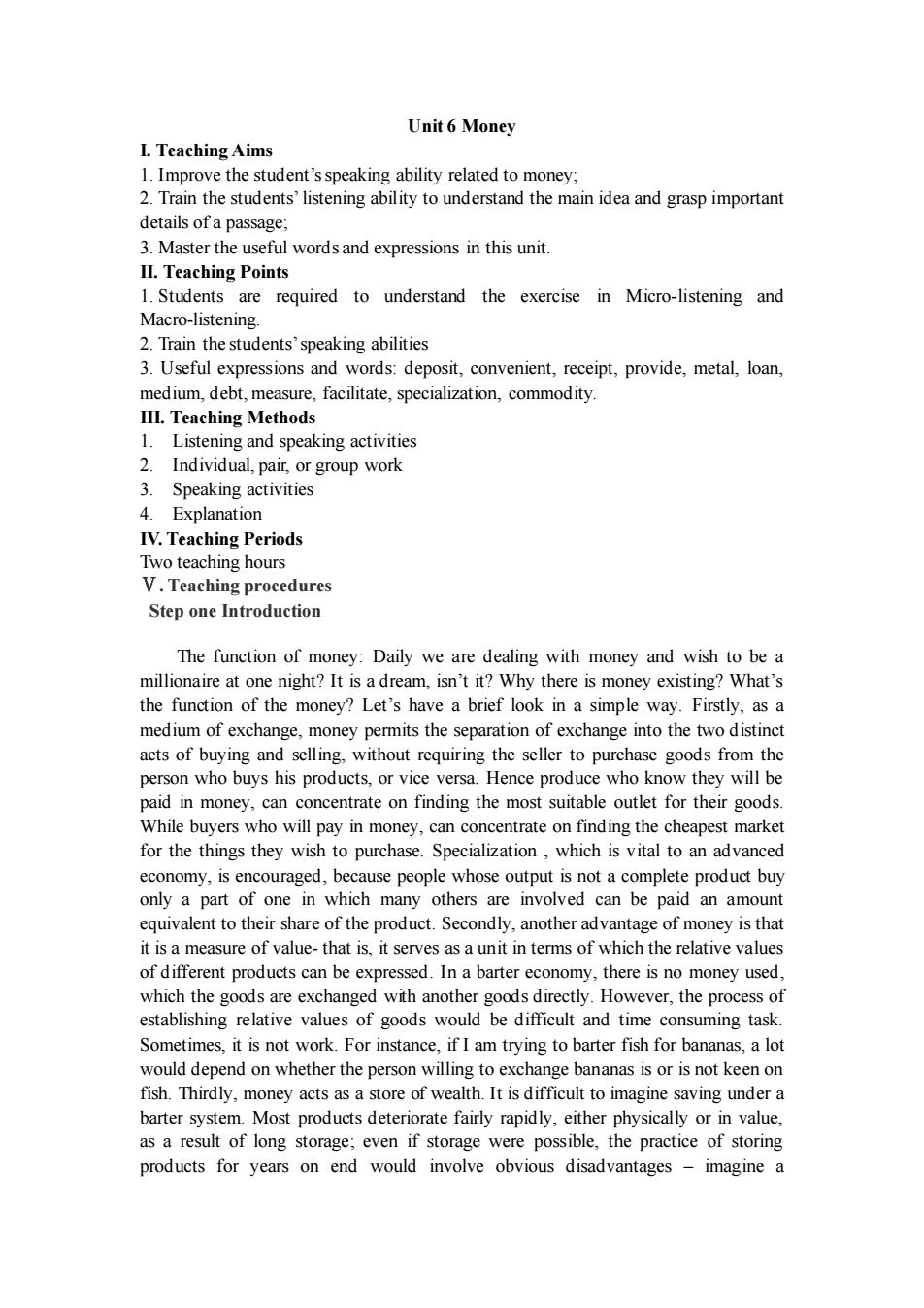正在加载图片...

Unit 6 Money I.Teaching Aims Improve the student's speaking ability related to money: 2.Train the students'listening ability to understand the main idea and grasp important details of a passage: 3.Master the useful words and expressions in this unit II.Teaching Points Students are required to understand the exercise in Micro-listening and Macro-listening. 2.Train the students'speaking abilities 3.Useful expressions and words:deposit,convenient,receipt,provide,metal,loan, medium,debt,measure,facilitate,specialization,commodity. II.Teaching Methods Listening and speaking activities Individual,pair,or group work 3.Speaking activities 4 Explanation IV.Teachi ng Periods Iwo tea ing hour V.Teaching procedures Step one Introduction The function of money:Daily we are dealing with money and wish to be a millionaire at one night?It is a dream,isn't it?Why there is money existing?What's the functi of the e money?Let's have a brief look ina simple wa Firstly,as medium of exchange,money permits the separation of exchange into the two distinc acts of buying and selling,without requiring the seller to purchase goods from the person who buys his products,or vice versa.Hence produce who know they will be paid in money,can concentrate on finding the most suitable outlet for their goods. While bu ate on finding the choa pe arket for the things they wish to purchase.Specialization,which is vital to an advanced economy,is encouraged,because people whose output is not a complete product buy only a part of one in which many others are involved can be paid an amount equivalent to their share of the product.Secondly,another advantage of money is that it is a measure of value-that is,it serves as a unit in terms of which the relative values rent products can be expres d.In a barte onomy,there is no money used which the goods are exchanged with another goods directly.However.the process of establishing relative values of goods would be difficult and time consuming task Sometimes,it is not work.For instance,if I am trying to barter fish for bananas,a lot would depend on whether the person willing to exchange bananas is or is not keen on fish.Thirdly, yact s a stor of wea h.It is ult to ag saving und barter system Most products deteriorate fairly rapidly,either physically or in value as a result of long storage;even if storage were possible,the practice of storing products for years on end would involve obvious disadvantages -imagine a Unit 6 Money I. Teaching Aims 1. Improve the student’s speaking ability related to money; 2. Train the students’ listening ability to understand the main idea and grasp important details of a passage; 3. Master the useful words and expressions in this unit. II. Teaching Points 1. Students are required to understand the exercise in Micro-listening and Macro-listening. 2. Train the students’ speaking abilities 3. Useful expressions and words: deposit, convenient, receipt, provide, metal, loan, medium, debt, measure, facilitate, specialization, commodity. III. Teaching Methods 1. Listening and speaking activities 2. Individual, pair, or group work 3. Speaking activities 4. Explanation IV. Teaching Periods Two teaching hours Ⅴ. Teaching procedures Step one Introduction The function of money: Daily we are dealing with money and wish to be a millionaire at one night? It is a dream, isn’t it? Why there is money existing? What’s the function of the money? Let’s have a brief look in a simple way. Firstly, as a medium of exchange, money permits the separation of exchange into the two distinct acts of buying and selling, without requiring the seller to purchase goods from the person who buys his products, or vice versa. Hence produce who know they will be paid in money, can concentrate on finding the most suitable outlet for their goods. While buyers who will pay in money, can concentrate on finding the cheapest market for the things they wish to purchase. Specialization , which is vital to an advanced economy, is encouraged, because people whose output is not a complete product buy only a part of one in which many others are involved can be paid an amount equivalent to their share of the product. Secondly, another advantage of money is that it is a measure of value- that is, it serves as a unit in terms of which the relative values of different products can be expressed. In a barter economy, there is no money used, which the goods are exchanged with another goods directly. However, the process of establishing relative values of goods would be difficult and time consuming task. Sometimes, it is not work. For instance, if I am trying to barter fish for bananas, a lot would depend on whether the person willing to exchange bananas is or is not keen on fish. Thirdly, money acts as a store of wealth. It is difficult to imagine saving under a barter system. Most products deteriorate fairly rapidly, either physically or in value, as a result of long storage; even if storage were possible, the practice of storing products for years on end would involve obvious disadvantages – imagine a